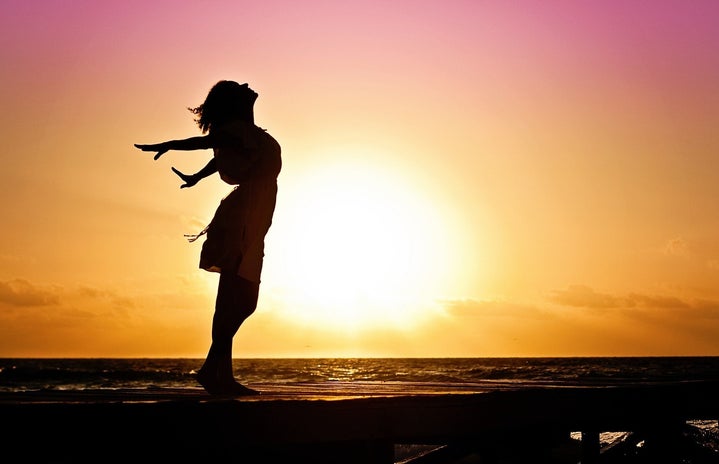Modern-day life is bursting with distractions, multi-tasking, clutter, and noise. In a reality that demands constant attention, such as the magnetic pull of your phone, it is becoming increasingly difficult to stay rooted in the present moment. But what does living presently even look like?
The state of living in the present is your ability to pay attention to the here and now. It is not allowing your mind to wander anywhere other than the current moment, focusing on your actions, sensations, and surroundings.
Although, this is significantly easier said than done.
In a constantly evolving society that demands perpetual change, we struggle to grasp the present day. Instead, we spend our time delving into the crevices of the past, searching for guidance and understanding, and projecting ourselves into an intangible future. Sometimes, I find myself living more in my head than where my physical body is, which can have negative impacts on our well-being.
According to PsychCentral, ruminating on the past can have the following negative effects:
- Causes or increases symptoms of anxiety and depression
- Impaired ability to focus
- Decreased motivation
- Negative change in sleeping patterns
However, thinking about the past and speculating about the future can be productive, and it’s often impossible to avoid. We can learn from past mistakes, celebrate and find guidance in our successes, and plan for the future. But it is also important to find a balance where we consider the past and future in terms of how it can benefit us in the present moment. What is unhelpful, is dwelling on past situations and mistakes, or worrying about the future when doing so impairs the situation you are in right now.
‘Learn from the past, live in the present, plan for the future’
~ Thomas Stachl
That being said, the only time we do have is now, regardless of our past or our future. The present moment is what we should be absorbed by if we want to live a fulfilling life. So how can this be achieved?
Mindfulness can be used to help us live presently, as you intensely focus on what you’re sensing and feeling in the moment, without interpretation or judgment. It helps you learn to appreciate the now. Mindfulness can be practiced throughout the day, in a randomly chosen moment, or through meditation. Whichever way you choose to be mindful, it can have many positive impacts on your health. Mindfulness teacher and writer, Ed Halliwell, explains that being mindful can help us deal with pain more effectively, reduce stress and its impact on our health, and improve our ability to cope with negative emotions, such as fear and anger.
Personally, I practice mindfulness when I feel overwhelmed by my thoughts or feel overstimulated in situations. I do this by focusing on the pattern of my breath and slowing it down, or naming three things I can see, smell and feel around me. In doing so, I am effectively rooting myself in the present moment, making me feel grounded and calm.
Meditation, the broader sphere in which mindfulness sits, is practiced with the sole intention of focusing on the present moment. As you learn to be present in your mind and body, you learn to cherish and value each moment, and therefore each day. It can be practiced according to your daily routine, in the spare, quiet moments, and can take as little as five minutes! A good place to start is downloading a meditation app such as ‘Headspace’ or ‘Calm’.
Another technique I use to live presently is journalling and affirmations, topics I have written about in previous articles. Journalling allows me to reflect on and appreciate small moments in the day that brought me joy, as they can often become overshadowed by a busy schedule. When journaling, I also practice affirmations such as ‘I am living presently’ or ‘I enjoy where I am now’ to reiterate feelings of grounding and appreciation.
These are just three quick and simple things I do to try to live more presently that can be easily integrated into a daily routine. In doing so, I find myself valuing the present moment more highly and dwelling less on negative thoughts, improving my overall well-being, happiness, and satisfaction.
In our current 21st century lives, living presently is becoming increasingly more difficult. As it becomes easier to witness the endless possibilities open to us, we become absorbed in any reality other than where we are now, constantly searching elsewhere for fulfillment and satisfaction. But I have found that true contentment comes when you treasure the moment you are in, right now, in the present, because that is all you have.


